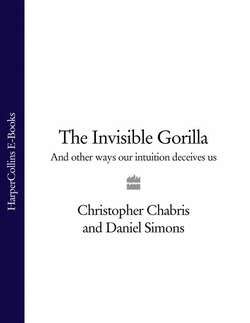Читать книгу The Invisible Gorilla: And Other Ways Our Intuition Deceives Us - Christopher Chabris - Страница 17
CHAPTER 2 the coach who choked
ОглавлениеBEFORE RETIRING FROM COACHING COLLEGE basketball in 2008, Bobby Knight led his teams to victory in more than nine hundred college games, more than any other Division I coach. He was a four-time national coach of the year, led the 1984 Olympic gold medal basketball team that featured future NBA stars Michael Jordan and Patrick Ewing, and won three national collegiate titles as the coach of the Indiana University Hoosiers. He was famous for running a “clean” basketball operation: His organizations were never accused of the sorts of recruiting violations that plague many top-tier basketball programs, and the majority of his players completed their college degrees. He was a coaching innovator whom many of his former players credit for their personal and professional successes. Despite this unparalleled record of achievement, Bobby Knight was fired from Indiana University in September 2000 after an undergraduate yelled “Hey, Knight, what’s up?” and Knight responded by grabbing the student’s arm and lecturing him on being respectful.
That Knight’s dismissal was triggered by a lecture on respect is ironic. Throughout his coaching career, Knight had a national reputation for a volatile temper, crass behavior, and a disdainful attitude toward the press and others. He regularly berated referees and journalists, and on occasion, he even threw chairs onto the court. He was the subject of a Saturday Night Live parody in which Jim Belushi played a high school chess coach who knocked over an opponent’s pieces and yelled at his own player, “Move it! Move it! Move the bishop!” Compared with other events in his career, the “what’s up” incident was actually small beer. It was considered a firing offense only because of a report published earlier that year that had led the university to adopt a zero-tolerance policy for his future indiscretions.
In March 2000, CNN and Sports Illustrated ran a story about why several top recruits had left the Indiana program. It focused on an incident described by Neil Reed, one of Knight’s former players. Reed was a star recruit, a high school All-American who scored an average of about ten points per game during his three years at Indiana. During a practice in 1997, Knight confronted Reed for failing to call out a teammate’s name when making a pass, but Reed stood his ground against Knight, claiming he had in fact yelled the name. According to Reed, Knight then physically attacked him:
At that point coach thrust right at me, just came right at me, wasn’t far away enough to where I couldn’t see it coming, was close enough to come at me and reach and put his hand around my throat. He came at me with two hands but grabbed me with one hand. People came in and separated us like we were in a school yard to fight…He had me by the throat for I would probably say that little situation lasted about 5 seconds. I grabbed his wrist and started walking back and by this time people, coaches Dan Dakich, Felling grabbed coach Knight and pulled him away.
The national reporting of this incident caused a sensation and led Indiana officials to shorten their coach’s leash. Reed’s account vividly confirmed Knight’s stormy reputation and put it in an even darker light. But shortly after the Sports Illustrated report, other people present at the time told a different story. Knight’s former assistant Dan Dakich said, “His allegation that I had to separate him from coach Knight is totally false.” Another player who had been on the team at the time said, “The statement that he was choked by coach Knight is totally ridiculous.” Christopher Simpson, a vice president of the university who attended many practices, was quoted as saying about Reed’s statements, “…I question anything Neil Reed says.” The team’s trainer at the time, Tim Garl, stated baldly, “The choking thing never happened…give me a lie detector.” Bobby Knight himself said, “I might have grabbed him by the back of the neck. I might have grabbed the guy and moved him over. I mean, if you choke a guy, I would think he would need hospitalization.” Everyone involved believed that their memories had accurately recorded what had happened, but their recollections were contradictory.1
